
 i_need_contribute
i_need_contribute

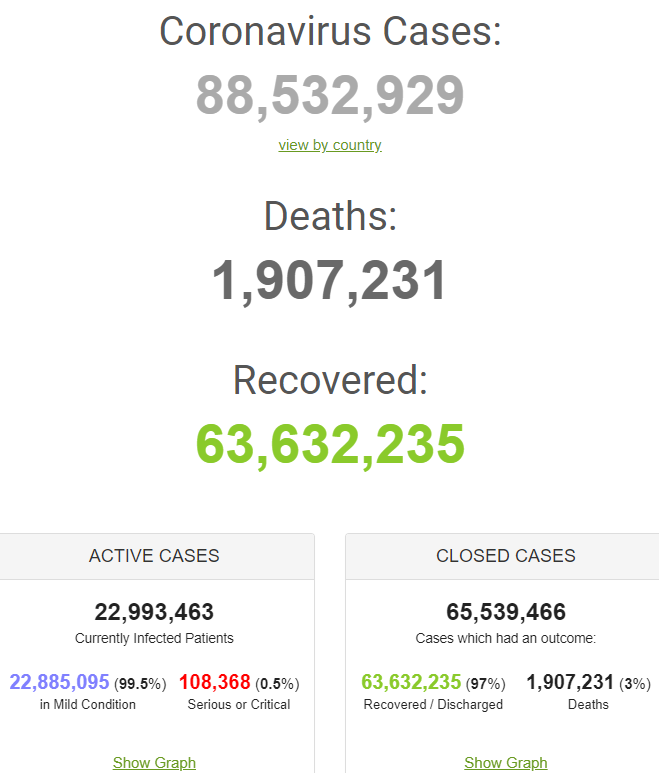
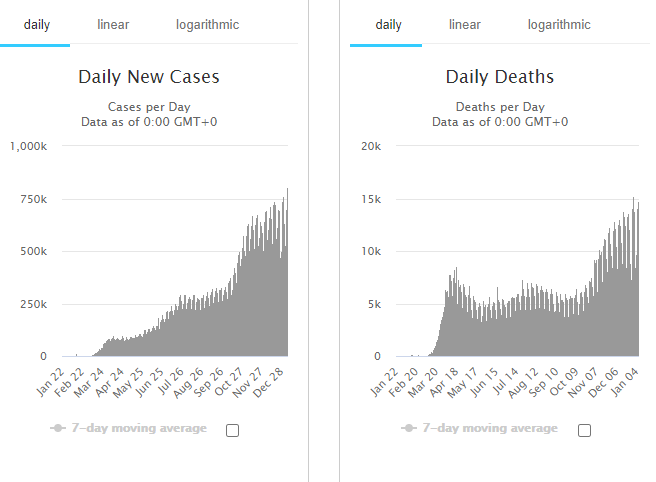
|
Country, |
Total |
New |
Total |
|
World |
88,480,105 |
+820,847 |
1,905,623 |
|
22,132,045 |
+274,190 |
374,124 |
|
|
10,414,044 |
+18,106 |
150,606 |
|
|
7,961,673 |
+87,134 |
200,498 |
|
|
3,332,142 |
+23,541 |
60,457 |
|
|
2,889,419 |
+52,618 |
78,508 |
|
|
2,727,321 |
+21,703 |
66,841 |
|
|
2,296,102 |
+12,171 |
22,264 |
|
|
2,220,361 |
+18,020 |
77,291 |
|
|
2,024,904 |
+16,850 |
51,675 |
|
|
1,869,306 |
+28,078 |
39,258 |
|
|
1,737,347 |
+17,576 |
45,067 |
|
|
1,690,006 |
+13,835 |
44,122 |
|
|
1,479,835 |
+13,345 |
129,987 |
|
|
1,356,882 |
+12,054 |
30,241 |
|
|
1,268,263 |
+6,360 |
55,933 |
|
|
1,170,590 |
+20,999 |
31,809 |
|
|
1,099,493 |
+8,997 |
19,505 |
|
|
1,026,690 |
+2,258 |
38,049 |
|
|
850,790 |
+9,627 |
12,084 |
|
|
797,723 |
+9,321 |
23,520 |
|
|
794,821 |
+17,723 |
12,702 |
|
|
658,958 |
+4,951 |
16,410 |
|
|
655,732 |
+2,997 |
19,883 |
|
|
635,134 |
+8,334 |
16,579 |
|
|
629,176 |
+3,693 |
16,913 |
|
|
600,755 |
+790 |
12,869 |
|
|
519,905 |
+1,007 |
7,718 |
|
|
495,075 |
+2,481 |
10,511 |
|
|
482,083 |
+1,353 |
9,356 |
|
|
471,048 |
+7,600 |
3,552 |
|
|
456,533 |
+9,927 |
7,472 |
|
|
448,678 |
+1,597 |
7,645 |
|
|
374,730 |
+2,540 |
6,568 |
|
|
363,485 |
+108 |
6,278 |
|
|
353,907 |
+1,787 |
3,479 |
|
|
334,836 |
+3,068 |
10,325 |
|
|
304,071 |
+1,215 |
3,968 |
|
|
269,091 |
+4,135 |
4,321 |
|
|
263,605 |
+412 |
1,903 |
|
|
258,393 |
+6,076 |
3,791 |
|
|
235,491 |
+1,612 |
2,694 |
|
|
222,885 |
+685 |
2,845 |
|
|
221,754 |
+2,988 |
694 |
|
|
218,385 |
+1,008 |
14,158 |
|
|
216,848 |
+562 |
4,266 |
|
|
207,259 |
+867 |
8,017 |
|
|
206,796 |
+1,838 |
1,489 |
|
|
204,699 |
+4,774 |
1,566 |
|
|
198,184 |
+2,137 |
2,717 |
|
|
Dominican |
177,493 |
+1,115 |
2,423 |
|
176,837 |
+1,842 |
1,487 |
|
|
176,407 |
+1,369 |
2,286 |
|
|
166,981 |
+1,713 |
9,287 |
|
|
161,054 |
+201 |
2,901 |
|
|
159,819 |
+775 |
2,262 |
|
|
154,546 |
+2,327 |
2,076 |
|
|
152,978 |
+540 |
938 |
|
|
152,254 |
+2,373 |
5,052 |
|
|
148,294 |
+423 |
3,106 |
|
|
146,809 |
+1,219 |
8,029 |
|
|
145,271 |
+210 |
245 |
|
|
145,252 |
+995 |
1,536 |
|
|
142,777 |
+510 |
5,146 |
|
|
141,074 |
+872 |
4,928 |
|
|
134,545 |
+2,663 |
2,922 |
|
|
130,070 |
+182 |
1,505 |
|
|
128,772 |
+594 |
2,799 |
|
|
128,465 |
+3,027 |
521 |
|
|
127,657 |
+6,503 |
2,307 |
|
|
127,227 |
+441 |
1,966 |
|
|
124,899 |
+1,077 |
3,192 |
|
|
115,322 |
+414 |
1,052 |
|
|
112,856 |
+1,162 |
2,352 |
|
|
103,515 |
+635 |
1,558 |
|
|
101,382 |
+262 |
2,792 |
|
|
97,733 |
+335 |
1,702 |
|
|
95,934 |
+1,565 |
1,330 |
|
|
94,633 |
+349 |
353 |
|
|
87,278 |
+63 |
4,634 |
|
|
85,494 |
+166 |
2,581 |
|
|
81,826 |
+170 |
1,363 |
|
|
77,412 |
+62 |
615 |
|
|
66,686 |
+868 |
1,046 |
|
|
61,705 |
+697 |
1,223 |
|
|
58,813 |
+33 |
29 |
|
|
55,461 |
+133 |
336 |
|
|
53,792 |
+825 |
467 |
|
|
51,160 |
+463 |
712 |
|
|
47,948 |
+303 |
1,390 |
|
|
47,592 |
+162 |
521 |
|
|
6,750 |
+84 |
130 |
|
|
5,883 |
+72 |
50 |
|
|
1,509 |
+4 |
35 |
Retrieved from: https://www.worldometers.info/coronavirus/
From CNN Health's Michael Nedelman
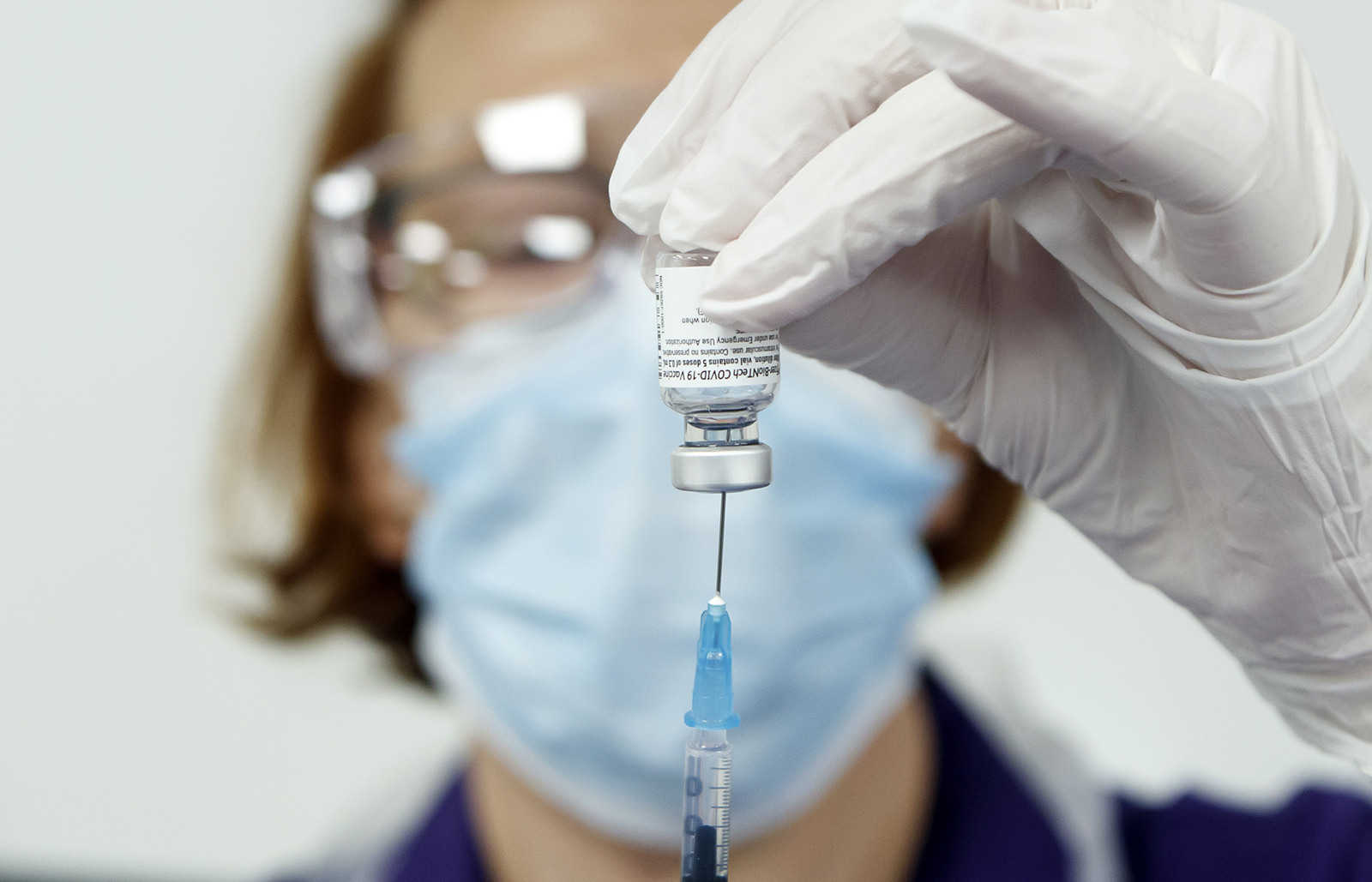
A nurse prepares the Pfizer-BioNTech vaccine at the Thackray Museum of Medicine in Leeds, England, on December 22, 2020. Danny Lawson/PA Images/Getty Images
A new study provides early evidence that a Covid-19 vaccine might be effective against two new coronavirus variants first identified in South Africa and the United Kingdom, despite a concerning mutation.
The two viruses share a mutation known as N501Y that scientists worry could allow the virus to evade the immune protection generated by a vaccine.
The researchers made a version of the virus in the lab that carries the mutation. They tested it against blood taken from 20 people who had received two doses of the Pfizer vaccine as part of a clinical trial. In research posted online Thursday, they said they found “no reduction in neutralization activity” against the mutated virus.
The N501Y mutation appears to help the virus attach to human cells, which may partly explain why these new strains appear to be more transmissible. But it is just one of many mutations in both strains that scientists have worried could make the virus less susceptible to vaccines or treatments.
The study -- conducted by researchers at Pfizer and the University of Texas Medical Branch -- does not test the full array of these mutations. It also has not been peer-reviewed.
In a statement last month, Pfizer said it had performed similar tests on “multiple mutant strains. To date, we have found consistent coverage of all the strains tested.”
It will be important to continue “monitoring of the significance of changes for vaccine coverage,” the researchers wrote.
That’s because of “the possibility that a future mutation … might necessitate a vaccine strain change.” Both Pfizer’s and Moderna’s vaccines use genetic technology that would allow the vaccines to be quickly adapted to account for mutations, they noted.
From CNN’s Sophie Jeong
Australia’s Greater Brisbane will enter a three-day lockdown to stop the spread of the United Kingdom strain of Covid-19 after a cleaner from a quarantine hotel tested positive for the UK variant, according to a statement from the Queensland government.
The cleaner was unknowingly infectious from last Saturday and tested positive for Covid-19 on Wednesday, according to a media release from Queensland’s Department of Health.
From 6 p.m. Friday, January 8, until 6 p.m. Monday, January 11, people in areas of Brisbane, Moreton Bay, Ipswich, Redlands and Logan will be required to stay at home, with some exceptions. More than 2.2 million people live in Greater Brisbane, with many of them living in Brisbane city, one of the country's most populous cities.
Exceptions include essential education and work, providing care to an immediate family member, essential shopping and exercising with no more than one other person. Masks will also need to be worn in those areas except if people are at home.
Queensland Premier Annastacia Palaszczuk said there are no second chances with this pandemic.
“I’m asking people to have a long weekend at home,” she said. “We have learned from Victoria, South Australia and New South Wales that a short, sharp lockdown is better than a long one.” She added “Three days is better than 30.”
From CNN's Jacqueline Howard
More than half of Covid-19 cases might have been transmitted by people not showing symptoms, according to a new study from researchers at the US Centers for Disease Control and Prevention.
It’s a model, not a real-life study, but based on data from eight studies done in China, about 59% of all transmission came from people without symptoms, the CDC team found.
"Across a range of plausible scenarios, at least 50% of transmission was estimated to have occurred from persons without symptoms," the team wrote in the journal JAMA Network Open on Thursday.
The model showed that about 59% of all transmission came from people without symptoms, which broke down to 35% from those who have not developed symptoms yet -- are presymptomatic -- and 24% from people who never develop symptoms.
Of course, the model provides only estimates about the spread of Covid-19 and more research is needed to determine whether the findings would be similar in the real world.
In the real world, the researchers wrote, "Measures such as mask wearing and social distancing empower individuals to protect themselves and, if infected, to reduce risk to their communities."
Retrieved from: https://edition.cnn.com/world/live-news/coronavirus-pandemic-vaccine-updates-01-08-21/index.html
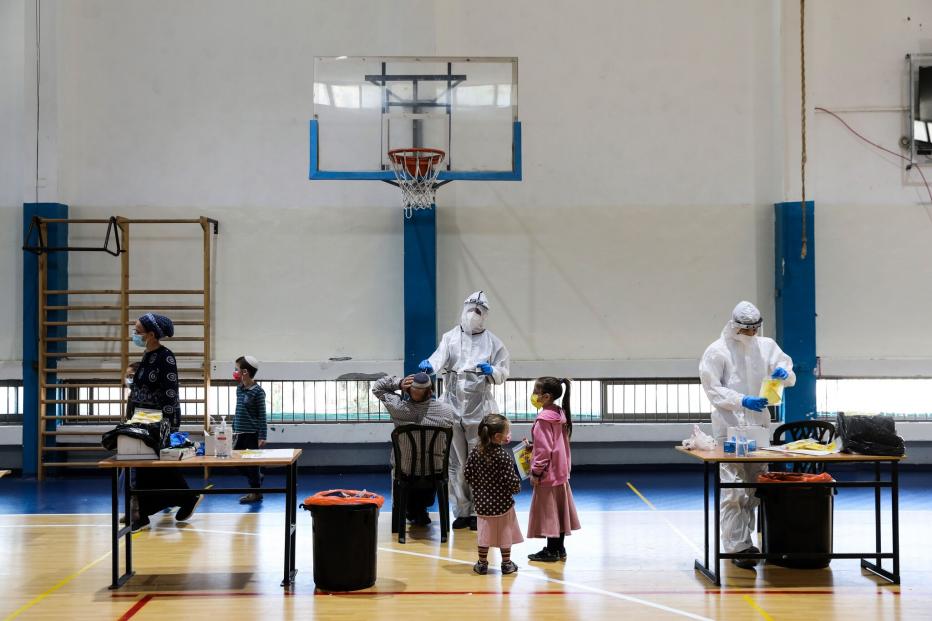
Israeli soldiers in full protective gear collecting swab samples for coronavirus tests in a gymnasium in Jerusalem on Thursday.Credit...Abir Sultan/EPA, via Shutterstock
In a boost to Israel’s vaccination campaign, Prime Minister Benjamin Netanyahu announced on Thursday that he had reached an agreement with Pfizer that will enable all Israelis above age 16 to be inoculated against Covid-19 by the end of March.
Mr. Netanyahu made the remarks hours before Israel was set to tighten its current lockdown in hopes of staving off the new, highly transmissible variant of the coronavirus.
“We are going to be the first country to beat the coronavirus,” Mr. Netanyahu declared in a statement at his office in Jerusalem.
The vow came after days in which health officials warned that Israel’s supply of vaccines was dwindling.
He said planes carrying the vaccine would be arriving soon and boasted that he had spoken to Albert Bourla, Pfizer’s chief executive, 17 times in the past several weeks.
More than 18 percent of Israel’s population has already received the first dose of the vaccine, a rate that has far outstripped the rest of the world and buoyed Mr. Netanyahu’s battered domestic image.
As part of the agreement with Pfizer, Mr. Netanyahu said that Israel would be an “international model for quickly vaccinating an entire country” and that Israeli authorities would share data with the pharmaceutical giant to help “develop strategies to defeat” the virus.
The Israeli health minister, Yuli Edelstein, said the government would give priority to a broader swath of its population to receive the vaccine starting next week. He did not give specifics.
As of Thursday, Israel was permitting people 60 and older to be inoculated, as well as a number of other target groups. It has also provided them to members of the broader public under some circumstances.
Despite his optimism about the vaccines, Mr. Netanyahu was adamant that Israelis abide by the lockdown. “It is forbidden to forget for a moment that the pandemic is raging around the world,” he said.
Israel has averaged 6,695 cases per day over the past week, a substantially higher number than the previous seven days, according to a New York Times database.
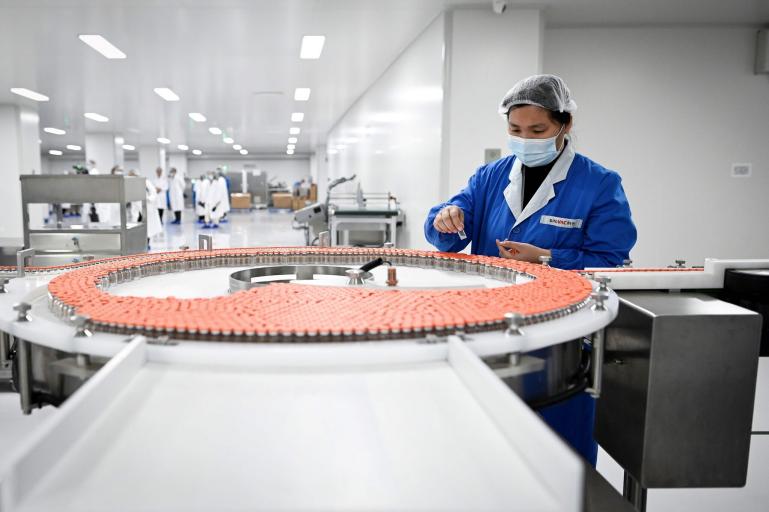
A worker in September at a factory producing Sinovac’s coronavirus vaccine in Beijing.Credit...Wang Zhao/Agence France-Presse — Getty Images
Brazilian officials said Thursday that a coronavirus vaccine made by a Chinese company was effective, bolstering the chances of approval for a second Chinese inoculation that could be rolled out in much of the developing world.
Officials in the state of São Paulo, where a prominent medical research institute carried out a large study of the vaccine made by the Beijing-based Sinovac, said the inoculation had an efficacy rate of 78 percent.
The vaccine prevented all participants from developing serious and mild complications from the virus, officials said, calling it a highly effective preventive tool.
In anticipation of approval, the vaccine, called CoronaVac, has already been shipped around the world as countries prepare for mass inoculation campaigns. Sinovac has sold more than 300 million doses, mostly to low- and middle-income countries, accounting for about half of the total doses that China says vaccine makers were capable of producing in 2020, based on an analysis of company statements and media reports.
China has set its sights on supplying the developing world with a Covid-19 vaccine, in a push to position itself as a leader in health diplomacy after its failures in the early days of the outbreak. It also wants to burnish its credentials in science by becoming a major player in the global vaccine business.
Even without the regulatory greenlight, China has embarked on an aggressive vaccination drive at home, with the goal of inoculating 50 million people by the middle of next month. Beijing has also developed an overseas distribution plan for exports, directing airlines to stock up on refrigerators and dry ice.
China is filling a void in poorer nations left by Western competitors. The United States is mainly focused on working through the chaos of distributing its vaccines at home. The European Union and other rich countries have bought many of the doses supplied by the American drugmakers Pfizer and Moderna.
“The Chinese have been eager to get out in front, aware of the gap and the hoarding and pre-purchase of so many billions of doses by the Western governments that is leaving so many countries high and dry,” said J. Stephen Morrison, director of the global health policy center at the Center for Strategic and International Studies.
“It will become a tool in their diplomatic alliances, and it will give them some measure of prestige and standing with countries that choose to make use of them,” he added.
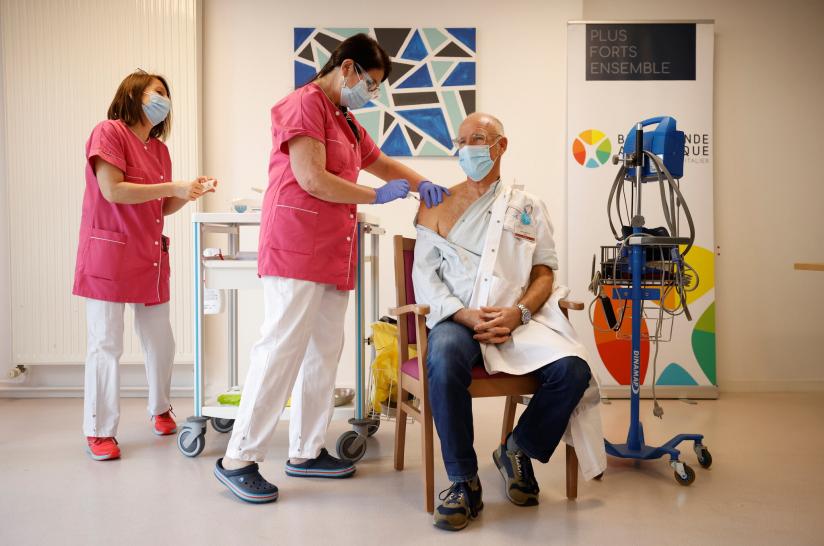
A medical worker administered the Covid-19 vaccine to a doctor in Vannes, France, on Thursday.Credit...Stephane Mahe/Reuters
French officials vowed to speed up their vaccination campaign on Thursday, but warned that restrictions and curfews would remain in place in order to halt a rise in infections and hospitalizations.
“2021 will be the year of hope,” Jean Castex, the prime minister, said at a news conference, citing the vaccine, which has been administered to about 45,000 people in France so far.
But he added: “It is out of the question that we drop our guard in the coming weeks.”
Mr. Castex said that the number of new daily infections was still high — hovering around 20,000 — and pressure on hospitals was still acute, with nearly 25,000 Covid-19 patients hospitalized around the country.
Mr. Castex announced that cultural establishments that are currently closed, like museums, movie theaters and music halls, would remain shuttered until the end of January at least, and that bars and restaurants would not reopen before mid-February at the earliest — dashing the hopes of the service industry, which was still hoping to reopen on Jan. 20, as previously scheduled.
An 8 p.m. to 6 a.m. curfew will also remain in place for the time being, Mr. Castex said. In 15 areas of France, that curfew has already been tightened to 6 p.m., and could be similarly restricted in the coming days in 10 new areas. Mr. Castex said he could not rule out new nationwide restrictions, but he added that schools would only close again if the situation became particularly dire.
Mr. Castex also addressed a barrage of criticism over the government’s sluggish vaccination rollout, acknowledging that it had started slower than in other countries but attributing the delay to France’s initial focus on retirement and nursing homes.
Still, the government vowed to speed things up, promising that at least 1 million people would be vaccinated by the end of the month and announcing that all people older than 75 would be eligible for vaccinations starting Jan. 18.
“We are doing everything to enable you to get vaccinated in good conditions,” Olivier Véran, the health minister, said at the news conference, adding that vaccination centers would soon open around the country and that people would be able to go through a simplified sign-up procedure to get their shots.
Mr. Véran also announced that French health authorities had approved administering the second Pfizer vaccine shot up to six weeks after the first shot, instead of the recommended three-week interval.
France also announced on Thursday evening that health authorities had detected two clusters of the new, more transmissible variant of the virus that was first identified in Britain. The clusters were in the Ile-de-France region, where Paris is, and in Brittany. Overall, French health authorities have reported 19 cases of the variant in France, and three cases of a different one first detected in South Africa.
“We want to avoid the spread of this variant in France at all costs,” Mr. Véran said of the British variant, adding that health authorities were closely monitoring it.
Retrieved from: https://www.nytimes.com/2021/01/07/world/france-coronavirus-vaccine-rollout.html
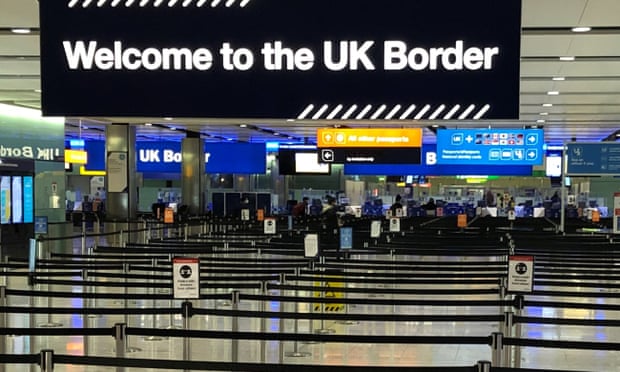
Heathrow airport. Photograph: Ben Fathers/AFP/Getty Images
Fears that Covid vaccines will not work against the new South African strain of the virus have prompted the introduction of testing for new arrivals into England and Scotland from abroad, the transport secretary, Grant Shapps, has said.
Outlining the new testing regime for England and Scotland, he said: “This is an extra check and we’re doing this now because there are these variants that we’re very keen to keep out of the country, like the South African variant, for example.
“There are the concerns about the South African one in particular, about how effective the vaccine would be against it, so we simply cannot take chances. So today because of that variant it has become much more urgent.”
But Shapps’ comments came as research showed the Pfizer vaccine does protect against new strains of the virus detected in both the UK and South Africa.
In the study, which has not yet been peer-reviewed, blood samples were taken from 20 people who received the Pfizer vaccine. Laboratory studies found that the samples had neutralising levels of antibodies that worked against the new strains.
Shapps confirmed that new arrivals would continue to have to isolate for 10 days, as well as show proof of a negative Covid test, unless they were travelling from countries deemed safe by the government.
He said: “If you’re coming here from anywhere, whether you’re a Brit or whether you’re a foreign national, then you will need to take a Covid test up to 72 hours before you come here. It doesn’t change the other things that you’ll need to do, in other words, the quarantine, if you’re coming from somewhere which isn’t on the travel corridor.”
Shapps also predicted Wales and Northern Ireland would introduce testing for new arrivals in the coming days. “I suspect it will be a UK-wide requirement from some point next week,” he said.
He cautioned that testing new arrivals would not pick up everyone who has the virus.
“Unfortunately, it doesn’t actually detect the majority of asymptomatic cases, the thing which does sort that out, is isolation or quarantine. That’s the thing which is still the gold standard and still, I’m afraid to be part of the solution here.”
Shapps defended the government against allegations it should have closed the border before, saying the UK as an island needed the movement of goods and people.
“Look what happened in the United States, for example, where last March they entirely closed the border,” he said. “It hasn’t helped them at all, not one iota.”
Retrieved from: https://www.theguardian.com/society/2021/jan/08/fears-covid-vaccines-would-not-work-against-south-africa-variant-led-to-travel-curbs
Here are the key developments from the last few hours: